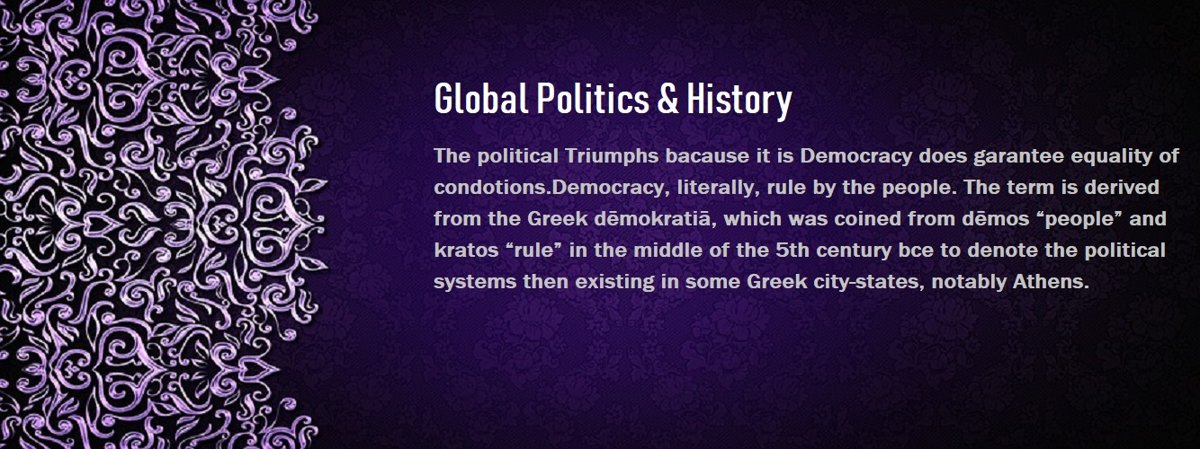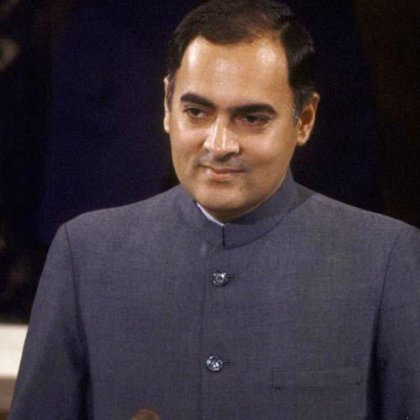RAJIV GANDHI WAS THE 6TH PRIME MINISTER OF INDIA (1984 -1989). HE WAS THE SON OF PRIME MINISTER INDIRA GANDHI AND RAHUL GANDHI'S FATHER. HIS ASSASSINATION MARKED THE END WHAT COULD HAVE BEEN IN INDIA'S MOST SUCCESSFUL POLITICAL SOJOURN.HIS ANTI CORRUPTION AND NEPOTISM STANCE EARNED HIM THE NICKNAME " MR.CLEAN".
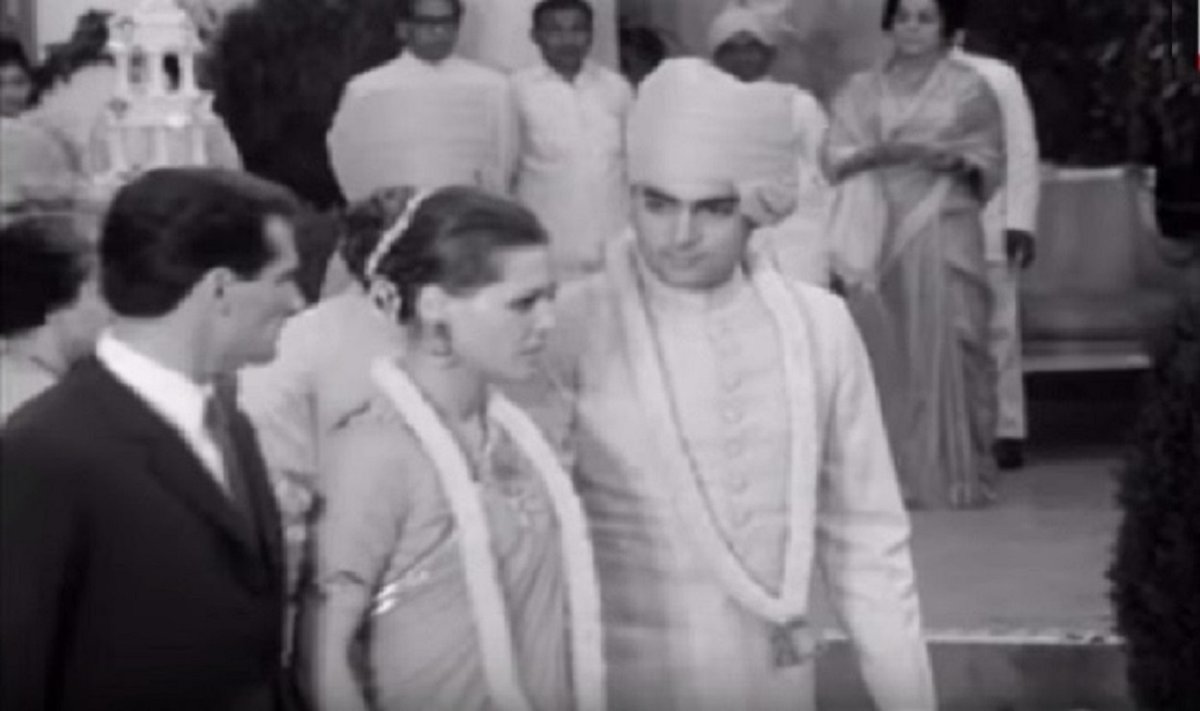 Two different countries, two different backgrounds, two different cultures but a shared destiny. Yes, it is the not-much-talked-about love story of Rajiv Gandhi and Sonia Gandhi.A love tale that became a political affair; Rajiv Gandhi and Sonia Gandhi's love story is so full of passion and warmth that it can inspire writers to pen down a love story. Rajiv Saw Sonia At A Restaurant In England, It Was Love At First Sight. They Got Married In India.
Two different countries, two different backgrounds, two different cultures but a shared destiny. Yes, it is the not-much-talked-about love story of Rajiv Gandhi and Sonia Gandhi.A love tale that became a political affair; Rajiv Gandhi and Sonia Gandhi's love story is so full of passion and warmth that it can inspire writers to pen down a love story. Rajiv Saw Sonia At A Restaurant In England, It Was Love At First Sight. They Got Married In India.
Rajiv Gandhi or Rajiv Ratna Gandhi was born on 20th August 1944 in Bombay. He was born to Feroz Gandhi and Indira Gandhi. He was the 7th Prime Minister of India serving from 1984 to 1989. He studied in Trinity College, Cambridge Imperial College London. On the day Indira Gandhi was assassinated Rajiv Gandhi was announced as the Next Prime Minister even with the likes of Experienced Pranab Mukherjee and PV Narasimha Rao. After his brother Sanjay Gandhi’s Death in Aeroplane Crash he Entered the Politics.He became the third generation in his family to become the Prime Minister of India - after his maternal grandfather, Pandit Jawaharlal Nehru and mother Smt. Indira Gandhi. He became the youngest Prime Minister of India at the age of 40. The developmental projects launched by him included the overhaul of national education policy and major expansion of the telecom sector. Rajiv Gandhi also emerged as one of India's more controversial Prime Ministers due to his alleged involvement in the Bofors scandal worth Rs. 640 million. His aggressive efforts to curb the LTTE in Sri Lanka led to his untimely assassination by the group in Sriperambudur in 1991. He was awarded the Bharat Ratna, India’s highest civilian recognition, posthumously in 1991.Feroze Gandhi, a key member of the Indian National Congress and the editor of The National Herald newspaper, was his father. Rajiv Gandhi initially attended the Welham Boys' School and subsequently went to the elite Doon School in Dehradun. Later, he went to the United Kingdom to study at the Cambridge University. Rajiv met Sonia Maino (later Sonia Gandhi) from Italy at Cambridge University. After his return from the United Kingdom, Rajiv Gandhi exhibited least interest in politics and focused onto becoming a professional pilot. He, later worked for Indian Airlines, as a pilot.After completing his A-levels in London, Rajiv Gandhi went on to study engineering at Trinity College in Cambridge. However, after studying there for three years, he did not obtain a degree. He went on to study mechanical engineering at Imperial College London but did not complete that either. He later confessed that he was not interested in “mugging.In Cambridge, Rajiv met his future wife, Sonia, who was sent at the age of 18 by her family to Cambridge to study English, at a Greek restaurant, the closet thing to an Italian or Indian restaurant in the town. Sonia later wrote, "We greeted each other and, as far as I was concerned, it was love at first sight." Rajiv seems to have been equally smitten with her. He tried to introduce to his mother on a visit to London. At the last minute Sonia panicked and couldn't go through with it. A second try was successful; Sonia found Indira to be “surprisingly friendly."Sonia's parents reportedly initially objected to the romance. Rajiv worked 10 hours a day at a construction job in Britain to earn enough money to visit Italy and won over Sonia's parents. Rajiv and Sonia were married in New Delhi in 1968. Sonia wore a pink sari that Nehru himself made while he was imprisoned by the British and that Indira wore when she was married. Rajiv promised his wife Sonia that would remain an airline pilot and never expose his children to the turbulent world of Indian politics. Rajiv had no inclination to follow his family’s tradition and join politics. It was his younger brother Sanjay Gandhi who was being groomed to take up the helms of the political legacy. But Sanjay’s premature death in a plane crash changed Rajiv’s destiny. The senior members of the Indian National Congress party approached Rajiv Gandhi to persuade him to join politics but Rajiv was reluctant and said "no" to them. His wife, Sonia Gandhi, also stood by Rajiv's position of not entering into politics. But after constant request from his mother Indira Gandhi, he decided to contest. His entry was criticized by many in the press, public and opposition. They saw the entry of Nehru-Gandhi scion into politics as a forced-hereditary-participation. Within a few months of his election as a Member of Parliament from Amethi, Uttar Pradesh, Rajiv Gandhi acquired significant party influence and became an important political advisor to his mother. He was also elected as the general secretary of the All-India Congress Committee and subsequently became the president of the Youth Congress.In June 1980 Sanjay Gandhi was killed while learning to fly when the plane he was piloting crashed in New Delhi. He had been instrumental as his mother's adviser in guiding Congress party and governmental affairs from the mid-1970s on. He was also a member of Parliament elected from the Amethi district of Uttar Pradesh state of northern India.Rajiv Gandhi contributed greatly to the development of the country. He announced a National Policy on Education in 1986 to modernise and expand higher education programs across India. He founded a central government based institution namely Jawahar Navodaya Vidyalaya System in 1986 for the upliftment of the rural section of the society providing them free residential education from 6th till 12 class. Due to his efforts MTNL established in 1986 and also created public call offices (PCOs) for spreading telephones in rural areas.
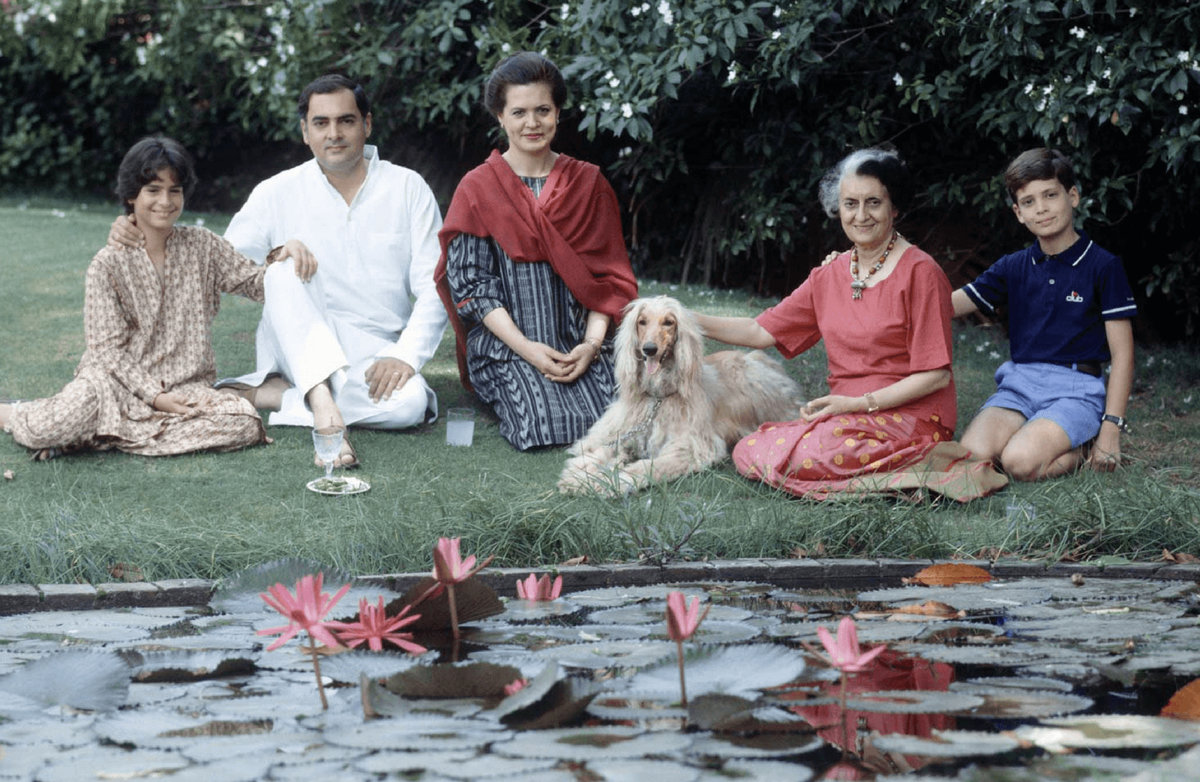 Ghandhis's family,Rajiv Gandhi's mother Indira Gandhi was assassinated by her own bodyguard on 31 October, 1984. In 1984, the Congress contested the Lok Sabha elections from Amethi under the leadership of Rajiv Gandhi and the Congress got 404 out of 533 seats, which was considered the biggest victory in the history. Thus Rajiv Gandhi became the youngest Prime Minister of India at the age of 40.
Ghandhis's family,Rajiv Gandhi's mother Indira Gandhi was assassinated by her own bodyguard on 31 October, 1984. In 1984, the Congress contested the Lok Sabha elections from Amethi under the leadership of Rajiv Gandhi and the Congress got 404 out of 533 seats, which was considered the biggest victory in the history. Thus Rajiv Gandhi became the youngest Prime Minister of India at the age of 40.
Following the assassination of Indira Gandhi on October 31, 1984, by her bodyguards at her New Delhi residence, Rajiv Gandhi was sworn as the Prime Minster. The Congress Party, riding high on the tragedy, witnessed a landslide victory in the parliamentary following elections.He was only three years old when India became independent and his grandfather Jawaharlal Nehru became the first Prime Minister of independent India. Do you know that Rajiv Gandhi's name was kept as Rajiv because the name of Jawaharlal Nehru's wife was Kamala which means goddess Lakshmi and 'Rajiv' word means Kamal or Lotus flower which is used to worship goddess Lakshmi. Rajiv Gandhi spent his childhood days with his grandfather at Murthy House, where Indira Gandhi served her father unofficially as a personal assistant.Rajiv Gandhi was the eldest son of Indira Gandhi and Feroze Gandhi. He was born on 20 August, 1944 in Mumbai. In 1984, he became the seventh and youngest Prime Minister of India after the assassination of his mother. For pursuing an Engineering degree he studied at Trinity College, Cambridge but was not able to complete his degree. Then he went to Imperial College London. He entered politics in 1980 after the death of his brother Sanjay Gandhi. Let's study some unknown and interesting facts about Rajiv Gandhi through this article.Rajiv Gandhi went to Welham Boys' School in Dehradun for some time but soon he was sent to the elite Doon School located in the foothills of Himalayas. Later, his younger brother Sanjay Gandhi was also sent to this school where the two stayed together. After leaving school, Rajiv went to Trinity College, Cambridge but soon he shifted to Imperial College in London. He studied mechanical engineering from there but could not be able to complete his course due to some reason.In 1966, Rajiv Gandhi came to India and till then his mother Indira Gandhi had become the Prime Minister of India. Rajiv Gandhi was very interested in music. He liked Western and Hindustani classical and modern music. He also had a passion for listening to radio and doing photography.Among all the mentioned hobbies Pilot was his biggest obsession. So, he went to Delhi and took pilot training from Flying Club and in 1970 as a pilot, he started working in Indian Airlines. This shows that he was not interested in politics. So far, his brother Sanjay Gandhi had entered politics with his mother. Rajiv Gandhi's met Edvige Antonio Albina Maino in London. In 1968, he married Edvige Antonio Albina Maino in New Delhi and renamed her Sonia Gandhi. They have two children, Rahul and Priyanka Gandhi.The economic policies adopted by Rajiv Gandhi were different from his predecessors like Indira Gandhi and Jawaharlal Nehru. He introduced policies that bordered on light-footed reforms of the existing economic agenda of the country which was based on protectionism following a Soviet model. These reforms paved way for the more extensive linearization efforts of the economy in 1991. Another major decision during his tenure as Prime Minister was the decision to do away with the license and quota Raj. He reduced tax on technological industry, reformed import policies related to telecommunication, defense, and commercial airline. He put emphasis on introduction of contemporary technological advances in various sectors, thus modernizing industries to attract higher foreign investment in the economy.His efforts to reduce the ‘Red Tape’ culture existing in the government economic and financial processes were aimed at encouraging the establishment of the private sector. In 1986, Rajiv Gandhi announced a "national education policy" to modernize and expand higher education programs across India. Rajiv Gandhi brought a revolution in the field of information technology and telecom. The idea led to setting-up of the Mahanagar Telephone Nigam Limited, popularly known as MTNL. Rajiv Gandhi was the man to transcend telecom services to the rural India or "India in true sense". As Prime Minister, Rajiv Gandhi endeavored to eliminate the corrupt and criminal faces within the Indian National Congress party. Going against the traditional socialism, Rajiv Gandhi decided to improve the bilateral relationships with the United States of America and subsequently expanded the economic and scientific cooperation with it. A revived foreign policy, emphasizing on the economic liberalization and information and technology moved India closer to the West.As the Prime Minister of India, Gandhi ensured stronger economic ties with the United States. He promoted the Gandhian philosophy of non-violence at the United Nations General Assembly by declining to join the Nuclear Weapon bandwagon and vocalizing in favor of a “Nuclear-Weapon Free and Non-Violent World Order”. He decided to lend his helping hand in dealing with domestic issues of several neighboring countries. In 1988, Maldives faced a coup and they sought Rajiv Gandhi’s help. He readily ordered the deployment of the Indian Army in an operation code-named Cactus. During the Sri Lankan Civil War, Gandhi sent the Indian Peace Keeping Force to the country to protect the civilians.
 Rajiv and Sonia Gandhi ,he was simple and influential personality. He always discuss with his party before taking any important decision. He led the country towards modernism, established schools, encouraged youth etc. He wanted to maintain unity in the country and the main objective of him was the construction of a twenty-first century India. In fact, his anti-corruption and nepotism stance earned him the nickname "Mr Clean". He was assassinated on 21 May 1991.
Rajiv and Sonia Gandhi ,he was simple and influential personality. He always discuss with his party before taking any important decision. He led the country towards modernism, established schools, encouraged youth etc. He wanted to maintain unity in the country and the main objective of him was the construction of a twenty-first century India. In fact, his anti-corruption and nepotism stance earned him the nickname "Mr Clean". He was assassinated on 21 May 1991.
In dealing with party affairs, Gandhi showed little tolerance for those members who were incompetent, corrupt, or sycophantic followers of the Gandhi family. He started to streamline the Congress organization by introducing modern managerial techniques and trying to bring younger, more dynamic people into the decision-making process. With these attempts and his rather gentle, soft-spoken personality, he gained an honorable reputation, although observers often wondered whether he had the political acumen and experience to deal with the knotty problems of state faced by his mother's administration, such as national integration and economic development.The problem of national integration eventually catapulted Gandhi into the position of prime minister. In the northern state of Punjab demands by the predominant Sikh community had grown for more autonomy for the state, greater retention of the state's resources, and solution of border problems with neighboring states and had combined with what might be termed Sikh ethnic and religious revivalism. A small group of so-called "extremists" held what the government considered to be an untenable position on the issue of autonomy bordering on a call for complete independence. Talks between the government and Sikh leaders faltered, violence erupted, and some extremists were implicated in the murders of Punjab government officials. Those accused and some of their followers sought sanctuary in the Golden Temple, the most holy shrine of the Sikhs, in the city of Amritsar. They were protected essentially by the government's reluctance to violate holy places by sending in the police. The stalemate continued for about three years.In the meantime, however, violence between various factions of the Sikh community escalated, and those hiding in the temple were accused of directing the murders of other Sikhs who disagreed with their position. Eventually the violence spread to the non-Sikh, primarily the Hindu population of Punjab. As it did, the government decided it had to act. In June 1984 troops were sent into the temple complex. During the armed confrontation most of those in the temple were killed, and hundreds of others throughout the Punjab were arrested. The government's action shocked the Sikh community and threats were made against the lives of the prime minister and other high ranking officials. The threat against Indira Gandhi was carried out on October 31, 1984, when Sikh members of her own bodyguard assassinated her.Rajiv Gandhi was then chosen by his party as prime minister. General elections to Parliament which normally would have been held in January 1985 were held one month early at the end of December 1984. The Congress party won an overwhelming majority, securing 401 out of 508 contested seats. This was better than any previous electoral victory. Gandhi proved himself as a tireless and effective campaigner in the weeks preceding the election and was widely credited, along with an improved economy, with the party's success. His standing within the party was also improved by his denial of electoral districts to party members considered to be corrupt. In March 1985 elections were also held in 11 states for the states' assemblies. Although the Congress party did not win in all 11, it did win in eight, and again Gandhi was credited with the success. He refused to let numbers of corrupt politicians run on the Congress ticket.Under his 1986-1990 plan Gandhi launched India towards strong economic growth by removing many restrictions on imports and encouraging foreign investment. Beyond this effort, Gandhi was seen as indecisive. Despite the firing of his mother's aides and surrounding himself with a constantly changing array of cabinet members, government corruption continued, including accusations that Gandhi and his party members were receiving kickbacks from a Bofors arms deal.In the November 1989 elections a former Gandhi loyalist, Vishwanath Pratap Singh, led a coalition to unseat the ruling party hurt by the numerous charges of corruption and incompetence. The Congress party lost its majority and Gandhi was forced to resign as prime minister. Although displaced, Gandhi's opposition to Singh's administration proved tireless. His determination to return to office inspired a campaign in 1991 that political analysts believed would result in an absolute majority for Gandhi and his party. But he would not resume his former position. On May 21, 1991, Gandhi was assassinated by a terrorist bomb while campaigning in Tamil Nadu. Tamil separatists claimed the killing was an act of revenge for Gandhi's intervention in the Sri Lanka civil war of 1987.The period between 1989 and 1991 was one of unrest in India. On one hand, the Congress had lost out miserably in the general elections of 1989, and on the other hand, the opposition too remained rather fragmented leading to the fall of two consecutive governments. In this atmosphere of uncertainty, the re-election of 1991 was extremely crucial to the president of the Congress party, Rajiv Gandhi. The scion of the Nehru-Gandhi family, Rajiv Gandhi had been in power previously between 1984 and 1989. But his term as prime minister was mired in several controversies related to corruption and also issues like the Shah Bano case and the Ram temple impasse. Faced with the challenge of redeveloping confidence of the public in the Congress party, Gandhi left no stone unturned to campaign across the length and breadth of the country.It was during this election campaign that Gandhi was assassinated by Liberation Tigers of Tamil Eelam (LTTE), a Tamil militant organisation based in Sri Lanka, that was fighting for a separate state for Sri Lankan Tamils. Gandhi faced the wrath of the secessionist group on account of his decision to use the Indian army to curb the movement in Sri Lanka. On May 21, 1991, while on an election campaign at Sriperumbudur near Chennai, he was assassinated by a human bomb that killed 17 others and left 44 injured.
 The assassination of Rajiv Gandhi, the ex-Prime Minister of India, occurred as a result of a suicide bombing in Sriperumbudur, near Madras, in Tamil Nadu, India on Tuesday, 21 May 1991. At least 14 others were also killed. It was carried out by Thenmozhi Rajaratnam, also known as Dhanu. The attack was blamed on the Liberation Tigers of Tamil Eelam (LTTE), a militant organization from Sri Lanka; at the time India had just ended its involvement, through the Indian Peace Keeping Force, in the Sri Lankan Civil War. Subsequent accusations of conspiracy have been addressed by two commissions of inquiry and have brought down at least one national government.
The assassination of Rajiv Gandhi, the ex-Prime Minister of India, occurred as a result of a suicide bombing in Sriperumbudur, near Madras, in Tamil Nadu, India on Tuesday, 21 May 1991. At least 14 others were also killed. It was carried out by Thenmozhi Rajaratnam, also known as Dhanu. The attack was blamed on the Liberation Tigers of Tamil Eelam (LTTE), a militant organization from Sri Lanka; at the time India had just ended its involvement, through the Indian Peace Keeping Force, in the Sri Lankan Civil War. Subsequent accusations of conspiracy have been addressed by two commissions of inquiry and have brought down at least one national government.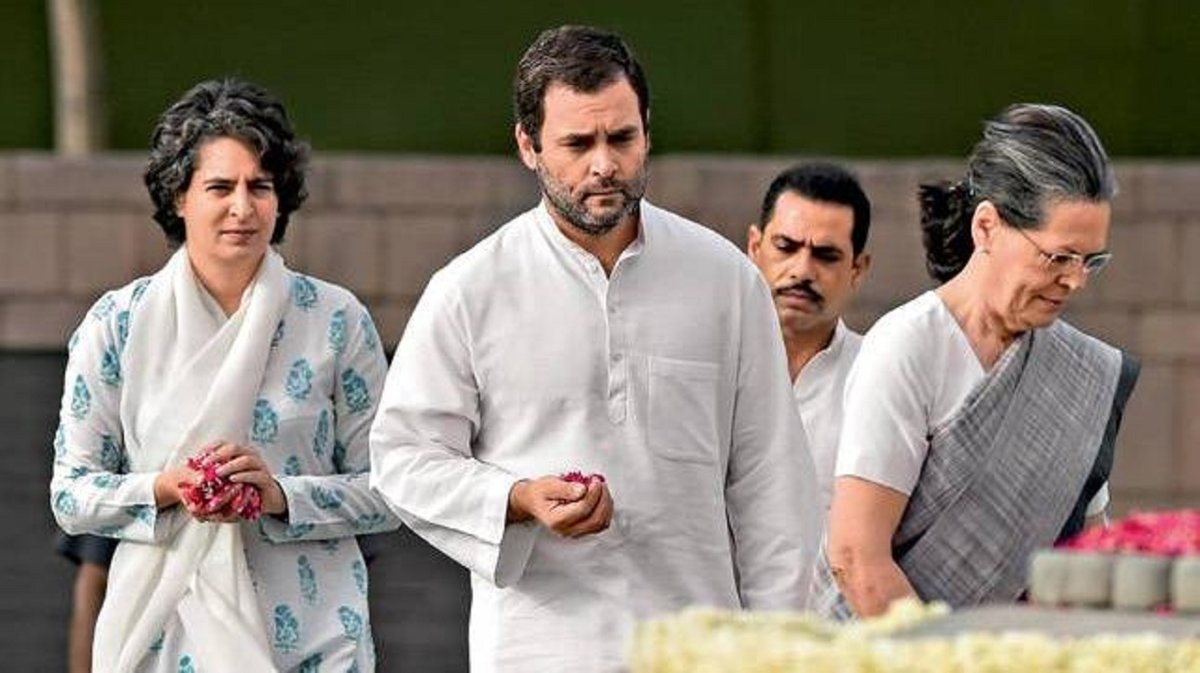 Priyanka Gandhi (L), Rahul Gandhi (C) and Sonia Gandhi (R) on Rajiv Gandhi's death anniversary, Gandhi Parivar paid tribute.On the occasion of the death anniversary of late prime minister Rajiv Gandhi, Sonia Gandhi along with other Gandhi family member paid tribute to him at his memorial.
Priyanka Gandhi (L), Rahul Gandhi (C) and Sonia Gandhi (R) on Rajiv Gandhi's death anniversary, Gandhi Parivar paid tribute.On the occasion of the death anniversary of late prime minister Rajiv Gandhi, Sonia Gandhi along with other Gandhi family member paid tribute to him at his memorial.
